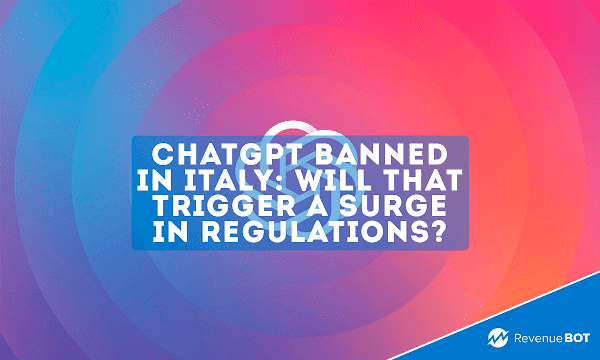
One of the earliest countries in the world to bar access to the ChatGPT bot is Italy. The Italian regulator accused OpenAI developer of a serious breach of privacy after a leak in March.
Due to a system failure, some users ended up seeing chats belonging to other people. Moreover, the names, email addresses, and even the payment details of users holding premium accounts became available to those who suffered from that very failure.

According to experts, the origin of this data leak appeared to be a March 20 event concerning ChatGPT users’ info. The authorities pointed out the absence of any information in the privacy policy about what kind of data is collected by OpenAI.
What is ChatGPT?
ChatGPT is an advanced language model developed by OpenAI. It stands as a robust artificial intelligence tool, which can generate text in different languages in the form of a chat. ChatGPT runs on the GPT-3.5 model and offers a vast array of knowledge and skills.
One thing that sets ChatGPT apart from other models is its ability to understand and interpret the given context, as well as it is able to generate coherent and relevant text in response to users’ questions or suggestions. The bot may be helpful in various areas, such as education, technical support, creativity, and more.

A major strength of ChatGPT is its flexibility and rapid learnability based on fresh data. You can further define and customize the model for specific tasks and subject areas, thus rendering it all the more useful and efficient.
While ChatGPT has plenty of advantages, it also comes with limitations. A neural network can create content that seems plausible, but is actually incorrect or unacceptable. Furthermore, without its own grasp of the world, it is unable to apply its own experience or serendipity to its decision-making.
Artificial intelligence and privacy risks
Given the current era of rapid technological advancement, the crossover between AI and privacy is now one of a key issues. Whereas artificial intelligence has the potential to revamp various aspects of our lives, it also poses inherent risks to our personal data.
Driven by sheer volume of data, AI algorithms are able to infer and predict our behavior, preferences, and even intimate details of our life.
Gathering and using personal data is considered as one of the key problems as well. AI-based programs basically thrive on data; they require access to vast amounts of information to learn and improve their algorithms. Nevertheless, relying on this data collection can lead to the aggregation of sensitive data, oftentimes without people’s explicit consent or knowledge.
Italy’s decision to outlaw ChatGPT sparked mixed reactions on social media, with some experts supporting the ban citing privacy concerns. Aaron Rafferty, CEO of the decentralized autonomous organization StandardDAO, acknowledged that a ban would be justifiable if only it presented unmanageable privacy risks. Rafferty added that addressing broader AI privacy challenges, such as data handling and transparency, could “be more effective than focusing on a single AI system.” He also noted that the ban could expose Italy to the global competition in the field of AI that the United States is currently facing as well.
Vincent Peters, a Starlink alumnus and founder of non-fungible tokens project Inheritance Art, said that the ban was justified, pointing out that GDPR is a “comprehensive set of regulations in place to help protect consumer data and personally identifiable information.”
Has a precedent been set?
As a result of Italy’s groundbreaking step towards banning ChatGPT, a wave of speculation has been raised about the possible continuation of similar actions by other countries or regions, marking a turning point for the global AI industry. Rafferty insightfully assessed the far-reaching implications of the imposed ban, realizing that each jurisdiction’s response to AI privacy concerns will be shaped by its particular context and regulatory landscape. He also highlighted the overall desire of countries to remain at the forefront of AI development, emphasizing the intense global competition that spurs innovation in the field.

Jake Maymar, vice president of innovation at augmented reality and virtual reality software provider The Glimpse Group, said the move will “establish a precedent by drawing attention to the challenges associated with AI and data policies, or the lack thereof.” To Maymar, public discourse on these issues is a “step in the right direction, as a broader range of perspectives enhances our ability to comprehend the full scope of the impact.” Vincent Peters agrees with Maimar and reckons that Italy’s decision may serve as a precedent for other countries subject to the General Data Protection Regulation (GDPR), encouraging them to scrutinize OpenAI’s practices in handling and using consumer data. Trento University’s Sebe believes the ban resulted from a discrepancy between Italian legislation regarding data management and what is “usually being permitted in the United States.”
Conclusion
Even though AI is developing by leaps and bounds and in spite of all the hype surrounding ChatGPT, the bot has shortcomings that may affect the privacy of users. This led Italian regulators to tighten the restrictions on the neural network in question. Whether or not this will be a common practice and will other countries follow Italy’s footsteps remains uncertain. Perhaps the OpenAI team will solve the incident, but either way, it will take a while.
